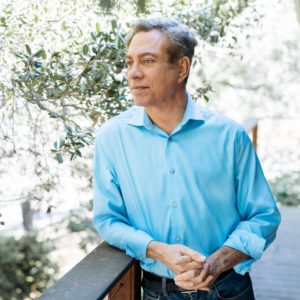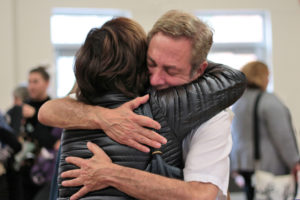Releasing the Guilt of Grief.

In our experiences of grief, guilt can play an outsized role. So today, David speaks to two members of his online grief group, Tender Hearts, who are both deeply immersed in guilt. “If only my boyfriend and I weren’t on a break, I could’ve saved him…” “If only I hadn’t let my son go outside, the tragedy never would’ve happened…” These are hard conversations. But in the process of unpacking our guilt and self-blame, we can begin to experience pure grief — and that’s when we open ourselves up to healing.

David Kessler is one of the world’s foremost experts on grief and loss. His experience with thousands of people on the edge of life and death has taught him the secrets to living a happy and fulfilled life, even after life’s tragedies. He is the author of six books, including his latest bestselling book, Finding Meaning: The Sixth Stage of Grief. He co-authored two books with Elisabeth Kubler-Ross, Life Lessons and On Grief and Grieving, updating her 5 stages for grief. He also co-wrote, You Can Heal Your Heart with Louise Hay. He also wrote Visions Trips and Crowded Rooms. His first book, The Needs of The Dying received praise from Saint (Mother) Teresa.
David’s personal experience as a child witnessing a mass shooting while his mother was dying in a hospital helped him begin his journey. For most of his life, David has taught physicians, nurses, counselors, police, and first responders about the end of life, trauma, and grief. He facilitates talks, workshops, and retreats for those experiencing grief. However, despite his vast knowledge on grief, his life was turned upside down by the sudden death of his twenty-one-year-old son. It inspired him to write his latest and most personal book, Finding Meaning.
He is Chief Empathy Officer for the Empathy.com app. David’s volunteer work includes being a founding member of Project Angel Food, a well-known and loved non-profit organization. He currently serves on the board of The Farrah Fawcett Foundation which provides cancer research, patient assistance, and prevention efforts. He also serves as Specialist Reserve for the Los Angeles Police as well as having served on the Red Cross’s disaster services team. He is the founder of Grief.com which has over five million visits yearly from 167 countries.
Guilt comes up so frequently in grief. Guilt, self-blame and shame often walk hand-in-hand in grief. Our work is to release the guilt so that we can get to the pure grief. In grief, we frequently have thoughts of how we might have done something differently and how we could have changed the results. In this episode, community members from my Tender Hearts group share their experiences with guilt and we work together.
Get a free worksheet and exercise on releasing guilt and finally letting go of the what-ifs and if-onlines. Click here to download your free worksheet and video.
www.tenderheartssupport.com - David's online grief support group, Tender Hearts
www.aboutgrief.com - Understanding loss and grief
www.lossofaparent.com - Death of a parent
www.parentforever.com - Death of a child and sibling
www.griefsuicide.com - Death of a loved one by suicide
988lifeline.org - 988 Suicide & Crisis Lifeline
nami.org - National Alliance of Mental Illness
afsp.org - American Foundation of Suicide Prevention
adultchildren.org - Adult Children of Alcoholics® & Dysfunctional Families
al-anon.org - Al-Anon Family Groups
amzn.to/31AZCPv - Finding Meaning: The Sixth Stage of Grief
actapublications.com/tear-soup - Tear Soup: A Recipe of Healing After Loss
www.elf-help.com/grief_therapy_124048.htm - Grief Therapy, Elf Help Books
Despite our best efforts and best intentions, people still die. We get stuck in our stories and believe that we have more power than we really do over life and death. In reality, several bad circumstances need to align for a tragedy to happen. Even if we had power over one, we rarely have power over everything that must be in place for the worst outcome. Remember, we often live our lives on the edge. We make mistakes. We forget things. And we usually survive our errors and questionable choices. And yet it’s human nature to experience guilt. We would rather feel guilty than helpless. It’s important to find compassion for yourself and to release the guilt.
Is it true? When you are experiencing guilt ask yourself if it’s really true. Did it really cause their death? David talks about the multiple factors that need to line up for the worst outcome.
Could you really have prevented death? 20/20 hindsight makes us think we have a power that we never really had. We do not have the power over life and death otherwise we would want to use this power to heal others.
Is this feeling of guilt new? Was the guilt there before? If you were feeling guilt in the past it may be worth considering that guilt is a go-to feeling and is bringing up old wounds.
Manage your expectations. We are quick to have compassion and forgiveness toward others and have unrealistic expectations of ourselves. We can be so tough on ourselves. If someone else told you this same story would you be more generous and compassionate to them?
What would your grief look like without the guilt? Ask yourself what your pure grief would be like without the guilt story. Our goal in grief is to grieve fully and live fully. Is the guilt preventing you from being able to grieve fully and live fully? What would your grief look like without the guilt?
Licensed Professional Counselors – Get listed on Grief.com

